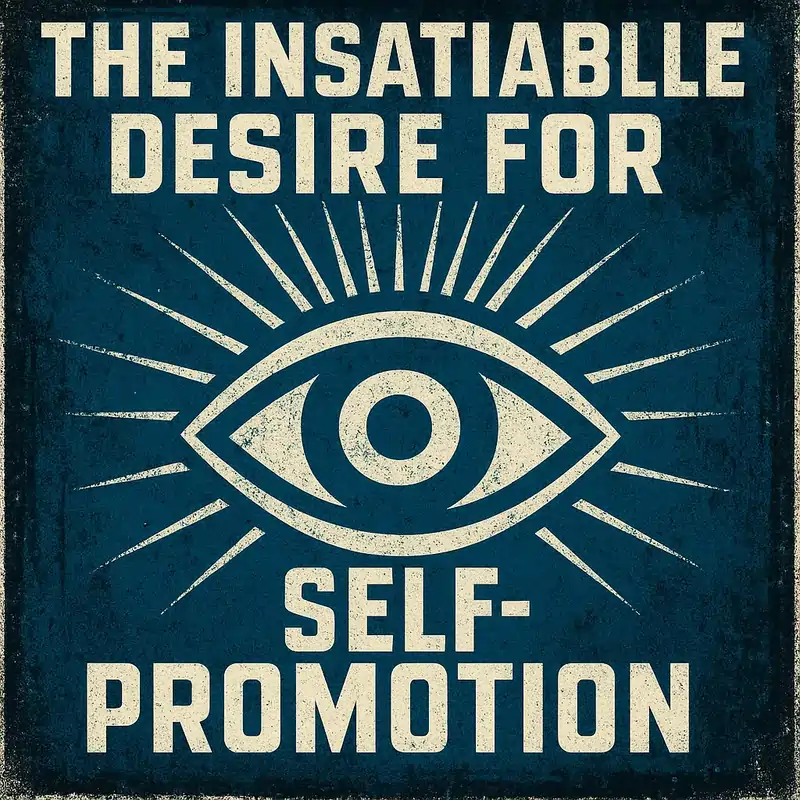Christian Identity and Self-Promotion
I remain continually struck by how the Internet and social media have cultivated a ravenous appetite for self-promotion. The prevailing sentiment suggests that the more our image or brand is seen, whether through curated posts, reels, or hashtags, the higher the chance it will be stumbled upon like a discarded winning lottery ticket. Underneath this spectacle lies a deeper illusion: that identity and marketing are inherently fused. We have become evangelists of our own personas, compelled to showcase ourselves with or without context, thrusting our platforms into view as if our worth depends on accidental discovery.
This drive has reshaped human interaction. It has birthed the phenomenon of the unsolicited “elevator pitch,” where even a 30-second silence is seized for self-branding. There’s no invitation, just a compulsion to be seen, to be known, to be validated. But when identity becomes contingent on visibility rather than vocation, the soul risks becoming a billboard rather than a temple.
It’s reminiscent of those infamous pop-up ads from the early Internet days, circa 1998 to 2004, an era when screens were bombarded with offers, scams, and digital noise. The sheer overload would crash your browser and paralyze your device. Ironically, even the so-called “pop-up blockers” became pop-ups themselves, flashing warnings, selling salvation from the very chaos they perpetuated. It was a paradox: the cure was embedded in the disease. The message was clear, visibility at any cost, even if the viewer never asked for it.
It was like being promised a cure for headaches by getting punched in the face, relief by escalation. Or a “cure for wellness” so pervasive that it required a subscription just to stop the therapy. The whole experience felt like a digital exorcism: your soul wasn’t sick, but someone showed up to sell you the cure anyway, on five consecutive tabs you never opened.
That era of marketing, noisy, intrusive, and ultimately counterproductive, bears a striking resemblance to the current ethos of self-promotion. Just like those pop-ups, today’s digital personas often shout into the void, offering something unsolicited, exaggerated, and ultimately exhausting. The modern “browser” is our mind, our attention span, clogged not with malware, but with content begging to be liked, shared, validated. And yet, the more this self-promotion multiplies, the less we hear; the louder it gets, the more invisible the message becomes.
This same philosophy found its way into the analog world too. Think of those business cards left on coffee shop bulletin boards, gas station counters, or slipped into public restroom mirrors, waiting like forgotten seeds of opportunity, hoping someone in urgent need of wedding photography or chiropractic work might glance down at just the right moment. It’s serendipity-by-littering.
Or consider the watermark culture of social media, where even a blurry sunset now carries a name, a handle, and sometimes a logo, just in case someone decides to turn that JPEG into a revenue stream. We watermark our memes, our children, our cats, our quotes from C.S. Lewis, “just in case it goes viral,” as if branding it might be the key to immortality.
Then there’s the traffic light hustle, the moment you’re idling at an intersection and see a cardboard sign duct-taped to a pole, scribbled in fading Sharpie: “We Buy Ugly Homes for Cash.” It’s not even clear who “we” are, or how this financial wizardry works, but somehow, someone thought a five-word plea scrawled like a ransom note was persuasive enough to get you to sell your life investment. It’s the marketing equivalent of whispering your résumé through a megaphone at a bus stop.
And who can forget the unsolicited friend requests from someone whose profile picture is a headshot in front of a bookshelf, clearly saying, “I’m not here to be your friend, I’m here to pitch a webinar.” Or the desperate signature lines at the bottom of emails: Jane Doe, Certified Coach | Helping You Live Your Best Life | www.janedoesaysitbest.com. Even birthday wishes become business funnels.
The Tragedy: Self-Promotion vs Discipleship in Christianity #
It’s no longer enough to be someone; now we must brand ourselves in every context, like we’re all walking around as lowercase trademarks, ™ next to our names, just in case. In all of these examples, architecture is the same: a desperate bid to be noticed that ironically results in being ignored. When everyone is vying for the spotlight, the light dims for everyone.
The real tragedy of this culture of constant, contextless promotion is that it’s not just annoying, it’s become a social pollutant. People scroll past it, walk past it, and delete it with reflexive speed. Like digital litter or noise pollution, it fills the space without contributing anything of value. It doesn’t just fail to engage; it actively numbs the audience. The human soul, already overstimulated and weary, learns to tune it all out.
Example Foolishness of Using Ineffective Methods Know for Failure
This isn’t just ineffective, it’s demonstrably a failed strategy. Studies in behavioral marketing consistently show that irrelevant messaging, poor timing, and lack of relational context result in decreased trust and diminished brand perception. When someone leaves business cards on every café table or splashes their face across an Instagram reel without purpose, it doesn’t draw interest, it dilutes credibility.
Take for instance the entrepreneur who hands out fliers in a church parking lot for financial coaching immediately after a funeral service, no context, no tact, no discernment. Or the musician who auto-comments on unrelated videos with links to their SoundCloud, it’s not engagement, it’s interruption. These aren’t outreach methods; they’re digital cold calls dressed as community.
Defining the Difference Between Marketing and the Gospel #
Yet let us be clear: this brand of relentless self-promotion must not be conflated with gospel witness. Leaving a gospel tract in a bathroom stall may look similar on the surface to leaving a business card, but the difference is eternal. The Word of God is not a pitch; it is “living and active, sharper than any two-edged sword” (Hebrews 4:12, ESV). Its power does not rely on algorithms, likes, or timing. It cuts straight to the heart, dividing soul and spirit, discerning the thoughts and intentions of man.
Biblical view of Influence and Branding #
“Prove all things; hold fast that which is good.” (1Th 5:21).
And therein lies the pastoral call: What are we doing, and why? Are we proclaiming the truth that sets captives free, or simply advertising ourselves, causes, ministries in hopes that someone will notice? Are we truly ministering, or marketing our ministries?
We must reflect, deeply and honestly, on our motives. Visibility is not a fruit of the Spirit. Faithfulness is. The spotlight can burn as easily as it can illuminate. Are we chasing platforms, or are we being faithful stewards of what God has entrusted to us?
We have reached a point where the need to be seen is so deeply embedded in our culture that it is often mistaken for the need to be faithful. But the Christian life is not built on metrics, optics, or exposure. It is built on obedience. And in a world brimming with noise, where even irrelevance can be marketed, the church must pause and ask a different question: Is what I’m doing bearing spiritual fruit, or just drawing digital traffic?
Scripture is unwavering on this: “Every way of a man is right in his own eyes, but the Lord weighs the heart” (Proverbs 21:2). At the root of all self-promotion is not necessarily malice, but often unchecked motive. Do we post, speak, or promote because we are led by the Spirit, or driven by the need to be seen, fear of isolation, insecurity, or ambition? Even good works lose their fragrance when performed for applause (Matthew 6:1,4). What we do may appear noble, but before the Lord, why we do it carries eternal weight.
Noise and the Still Small Voice: Hearing in a Loud World
Elijah didn’t find God in the wind, the earthquake, or the fire. He heard Him in a still small voice (1 Kings 19:11,13). And yet, how often do we chase the wind of viral trends, the fire of controversy, or the earthquake of cultural outrage, thinking God must be there? The Spirit does not shout to compete with cluttered feeds. He whispers. But if our lives are saturated with our own noise, how will we ever hear Him?
The Countercultural Witness of Silence in a World Obsessed with Visibility
In an age where silence is interpreted as irrelevance, the Christian’s quiet faithfulness is revolutionary. Jesus, the incarnate Word, spent thirty years in relative obscurity before preaching a single sermon. John the Baptist said of Jesus, “He must increase, but I must decrease” (John 3:30). That is the posture of the cross-shaped life. Choosing silence when you could self-promote is a profound act of trust in God’s providence. It’s a witness louder than words.
Redeeming Communication: Being Present, Not Prominent
God’s Word doesn’t call us to withdraw from culture, but to enter it wisely. That includes the digital and relational spaces we inhabit. We are not forbidden to speak, we are commanded to speak the truth in love (Ephesians 4:15). Effective communication in today’s world means being slow to speak, quick to listen (James 1:19), and guided by grace. Let us post with purpose, converse with compassion, and engage with the humility that says, “Not to us, O Lord, not to us, but to your name give glory” (Psalm 115:1).
A Call to Reorient: Repent, Reflect, and Realign
This is not merely a critique of culture. It is a call to repentance. The early church didn’t need branding, they had boldness. They didn’t need marketing, they had the Spirit. If we find our energy going more toward promoting ourselves than proclaiming Christ, then we must return to our first love. Let us ask God to purify our motives, sanctify our strategies, and realign our witness with His mission. For the world does not need more personalities, it needs more presence. The presence of Christ, through His church, humbly embodied and unashamedly proclaimed.
In a world enamored with spotlight, let the church be content with obedience. In a culture addicted to applause, let the church be anchored in truth. And in a generation where everyone wants to be known, let us boast in this alone: that we know the Lord (Jeremiah 9:23,24).






